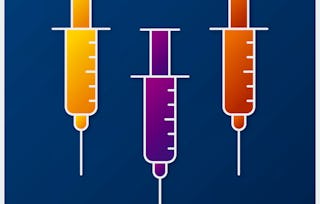This course describes the underpinning science around vaccines and their development. It will look at the immunological underpinnings of how vaccines induce protection. It will also look at the epidemiological basis of how vaccines are rolled out. Finally it will explore how new vaccines are developed.

How Vaccines Work

How Vaccines Work
This course is part of Foundations in Virology and Vaccinology Specialization

Instructor: John Tregoning
4,360 already enrolled
Included with
57 reviews
Recommended experience
What you'll learn
Recognise how viruses cause infections
Recognise how vaccines prevent infections
Skills you'll gain
Details to know

Add to your LinkedIn profile
4 assignments
See how employees at top companies are mastering in-demand skills

Build your subject-matter expertise
- Learn new concepts from industry experts
- Gain a foundational understanding of a subject or tool
- Develop job-relevant skills with hands-on projects
- Earn a shareable career certificate

There are 4 modules in this course
Basic overview of the immune system. This will cover: what is the immune system, what is immune memory, why that is important for vaccines, the key cells of adaptive immunity and then how these all contribute to vaccine induced protection.
What's included
9 videos7 readings1 assignment
This module will cover vaccines at a population level introducing some epidemiological principles. We will explore how infections spread (and how we model that). We will introduce the role of herd immunity. We will discuss what pathogen eradication means and what types of disease are eradicable and which ones are not?
What's included
6 videos4 readings1 assignment2 discussion prompts
Novel vaccines are no use if they are stuck on the shelves of research labs, they need to be deployed to prevent infections. Here, we will explore the process of clinical trials which test vaccines for safety and efficacy (whether they work), we will look at ways to measure vaccine success. Then move onto how vaccines are made and how they are deployed.
What's included
6 videos5 readings1 assignment3 discussion prompts
As we have seen during the COVID-19 pandemic, there is a need for new vaccines. But it isn’t just for novel emerging diseases. There are a whole host of endemic infections that would benefit from new vaccines. With changing population dynamics and climate change, different disease profiles would benefit from vaccines. Here, we will explore why we might need new vaccines. We will look what an ideal vaccine might look like, and the scientific challenges in developing one. We will then look at the real-world challenges that prevent uptake and deployment of such a vaccine, both logistic and societal.
What's included
6 videos5 readings1 assignment3 discussion prompts
Earn a career certificate
Add this credential to your LinkedIn profile, resume, or CV. Share it on social media and in your performance review.
Instructor

Offered by
Explore more from Basic Science

Imperial College London

Imperial College London

Imperial College London
Why people choose Coursera for their career

Felipe M.

Jennifer J.

Larry W.

Chaitanya A.
Learner reviews
- 5 stars
91.22%
- 4 stars
7.01%
- 3 stars
1.75%
- 2 stars
0%
- 1 star
0%
Showing 3 of 57
Reviewed on Dec 5, 2025
Excellent piece of knowledge in such a short span of course duration
Reviewed on Feb 8, 2025
Clear and concise descriptions in all videos of each week. Well presented, and am looking forward to follow-on courses.
Reviewed on Aug 13, 2024
Excellent really enjoying, easy to understand and navigate thankyou

Open new doors with Coursera Plus
Unlimited access to 10,000+ world-class courses, hands-on projects, and job-ready certificate programs - all included in your subscription
Advance your career with an online degree
Earn a degree from world-class universities - 100% online
Join over 3,400 global companies that choose Coursera for Business
Upskill your employees to excel in the digital economy
Frequently asked questions
To access the course materials, assignments and to earn a Certificate, you will need to purchase the Certificate experience when you enroll in a course. You can try a Free Trial instead, or apply for Financial Aid. The course may offer 'Full Course, No Certificate' instead. This option lets you see all course materials, submit required assessments, and get a final grade. This also means that you will not be able to purchase a Certificate experience.
When you enroll in the course, you get access to all of the courses in the Specialization, and you earn a certificate when you complete the work. Your electronic Certificate will be added to your Accomplishments page - from there, you can print your Certificate or add it to your LinkedIn profile.
Yes. In select learning programs, you can apply for financial aid or a scholarship if you can’t afford the enrollment fee. If fin aid or scholarship is available for your learning program selection, you’ll find a link to apply on the description page.
More questions
Financial aid available,

